How to Qualify for Boston Marathon (My 11 Minute PR)
- June 5, 2017
- Last Updated: December 23, 2024
- 35 Comments
- Running
Hi and good morning! I’m so excited to talk about how to qualify for the Boston Maraton today (or at least how I did, back in 2017). Many of the tips I’m sharing worked well for ME, and perhaps, not all will apply to you.
But in general, I think a combination of rest, nutrition and proper training will help you qualify for Boston Marathon.
As an Amazon Associate, I may earn from qualifying purchases. You can read more here about our Disclaimer and Privacy Page.
Thank you all for your comments and encouragement on my Ogden Marathon recap post. I’m happy to share a little bit more about my training cycle for those of you who have asked.
For the past story, I ran my first marathon last November (Savannah Rock ‘n Roll Marathon Recap) in 3:41.57. Nearly 6 months later, I ran my second marathon in 3:31.05.
That’s a pretty substantial difference – and I think I took some key things away from my first marathon that I was able to put to use for my second.
Training to Qualify for Boston Marathon
Now I’m going to review some of the differences between my first and second marathons, to touch on my training to qualify for the Boston Marathon.
Firstly, I think it’s a totally different mindset doing your first versus subsequent marathons.
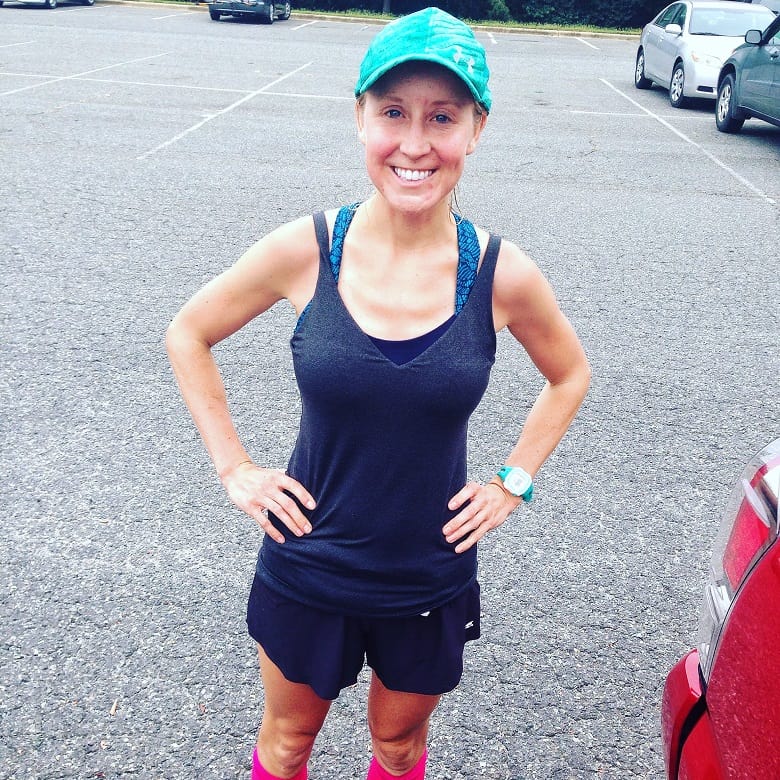
I certainly had a little more confidence going into my second training cycle, and didn’t stress out as much about missing a run here or there, or shortening a long run.
But, here are some of the things I focused on that I think made a big difference, in no particular order.
Do You Have to Qualify For the Boston Marathon?
Unless you’re running in or for a charity, yes you do! How do you qualify for the Boston Marathon?
You run a fast qualifying time, at an approved marathon distance race!
That’s what I’m discussing throughout this post. But one last question.
What Are Qualifying Times for the Boston Marathon?
They change, year to year. Which is frustrating and tricky!
I googled how to qualify for Boston Marathon 2017 when I was running my marathon in Ogden. Because, since I wanted to run in 2018, I had to qualify in 2017.
For my women’s age group division (Age 18-34), the qualifying time in 2017 was 3:35:00. But, you usually have to beat that time by a few minutes to be considered because so many people are applying!
There is also a specific timeline for which you ran/run your qualifying time (generally, two years) to be able to apply for and get selected for the Boston Marathon.

Join a Running Group
Though I only did this a handful of times (like fueling 20 miles), I really feel that it has so many benefits.
Aside from socialization (running alone sometimes can be isolating), group runs were pivotal for how to improve running marathon speed (and half marathon speed), and certainly helped my confidence and pace.
Plus, you learn things from other runners, and learn more about yourself.

Add Core Work
I did make an effort to do more core work in this training cycle. I tried to include some exercises 4-5 days a week. And not even long or intense exercises. My favorite core workouts are 4-6 minutes long.
I actually hate core work so if it’s long, I know I won’t do it. Short and sweet is effective for me!
Eat at Any Sign of Hunger
It’s no wonder I later went on to write a Hunger Ebook.
The week before the marathon, I was eating like a madwoman. And it wasn’t an increased appetite from increased running or calorie expenditure.
I obviously had my lightest taper week, and only ran 2-3 days that week. But, preparing my body for what it was about to experience was paramount – I wouldn’t let my body feel any sign of hunger.
I nourished hunger, even if it meant 3 breakfasts like I had 2 days before the race.
If you need encouragement or understanding of why hunger is important to listen to, read this post.

Don’t forget about FAT
Eating more requires eating more of ALL foods – typically fats and carbohydrates.
Not only do they help with inflammation in the body (hello, running causes inflammation in our cells and muscles), they are another macronutrient our body will draw from when it runs out of fuel and glycogen (carbohydrates).
Plus, it tastes pretty good too!

Allow Ample Recovery Time
I took two days off a week, completely, and included one day of cross training where I’d do hot yoga, cycling or elliptical.
It was too much stress on my body to do more than 4-5 days of running per week, as I discussed in this flexible marathon training plan.
Each person is different but there’s no magic number of days you HAVE to run per week. Time on your feet is very important too, so engaging in other exercise counts.

Here are some of my tips for forming your marathon recovery plan.
And, foam rolling, epsom salts and the running stick should be your best friend!
Recovery food is important too!

Find a Supportive Community
A running group is great!
Obviously, you are making sacrifices in your training cycle. You want to have people in your life who understand these sacrifices (they don’t necessarily have to be runners).

You shouldn’t feel bad about the time you are committing to reach your goal, so people who understand that are paramount. Surround yourself with those people who lift you up!
Be Consistent with Speed Work
I did longer and harder tempos/speed work than my first time around. I still don’t think I did enough speed work, I guess that’s one thing we can always self-critique as runners.
But I did do some longer workouts (like this 60 minute speed interval workout and this cruise reps workout).
The pyramid workout for speed remains my favorite.
I also found it helpful to do some speed work that mirrored the course, which was mostly downhill.
While most people practice hill repeats UP a hill, I practiced some downhill running repeats so I could practice keeping my arms relaxed and leaning forward.

Relax the Week of the Race
I know that the marathon taper can be difficult, particularly mentally, but it’s so important to allow your body rest and load up those glycogen stores.
People have different views on tapering, but I think I ran 8-10 miles the week of the marathon.
To compare, most of my weekly training had me between 30-40 miles per week. The final week, I did all of my runs at a 9-9:30 pace.

My goal marathon pace was 7:50-8:05ish per mile.
I didn’t taper as much in my first marathon, and I think I was a little more active the week of. Clearly, the extra rest served me well.
Have A Race Day Nutrition Plan
Make sure you’ve practice your race day nutrition plan several times! What you’re going to take, how much, how you’re going to take it (powder vs liquid vs gel vs real food), how you’re going to hold it, etc.
So so important!

Stay Hydrated Every Day
Obviously, hydration is always a big one. I’m a pretty good water drinker and probably drink about 11-12 cups a day, plus the water I get through food.
But the week of the marathon, I drank sooo much water that I was peeing multiple times throughout the night.
I actually had a hard time adjusting to altitude and no matter how much water I drank, my pee was very concentrated, so I knew I had to do better.

If you’re not hydrated, your cells aren’t getting the nutrients they need and you’ll have a hard time feeling good.
Here are more tips on staying hydrated when running in hot weather.
Stay with a Pace Group on Race Day
I settled in with the 3:35 pace group and stayed with them for the first 7-8 miles.
That helped me figure out what pace I wanted to maintain and helped me realize I felt good doing that.
The pace groups are great if you’re aiming for consistency in your running.

Choose the Right Course
Research what the best marathons to run to qualify for Boston are. Choose one of those! Beliee me – choosing the easiest marathon to qualify for Boston WILL make a difference, and why not use it? 🙂
There is a strategy in which course you choose for your overall time.
I would tell everyone to pick a down hill course if you’re trying to qualify for Boston!
Although too much down hill can be killer on your quads and require a lot of energy, a net downhill course definitely helps, or at least, helped me.
The last 4-5 miles were all downhill, so I was still maintaining the same pace with less effort, and it really helped.
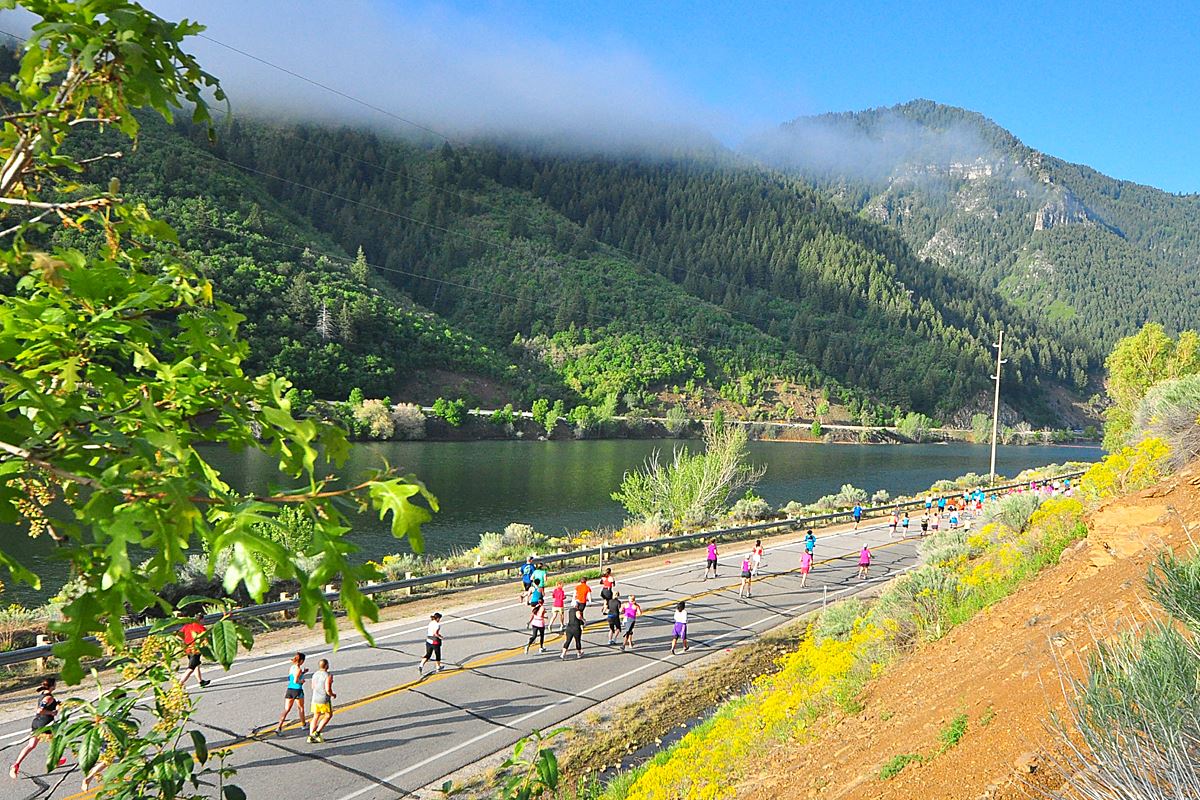
Obviously, nutrition plays a big part too. I’m a big proponent of workout recovery foods, and nutrient timing, one thing I work with all of my running clients on.
I’ve spoke about my race day nutrition plan before, but I’m a big proponent of UCAN, Huma gels and Honeystinger chews (taste like candy) and rely on them the most.
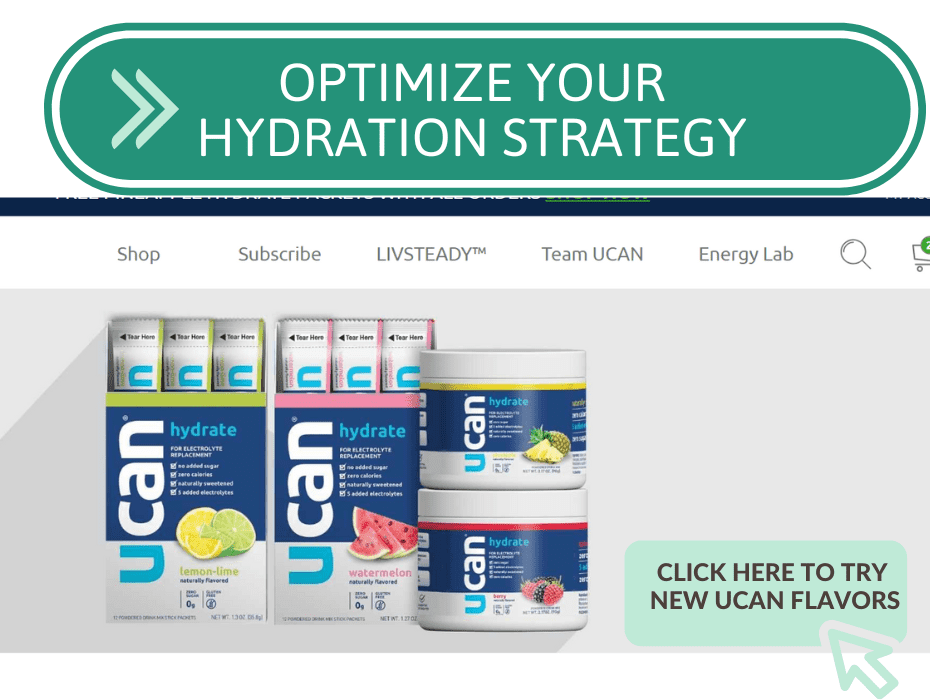
Most importantly, I think remaining calm and being prepared can bring you a long way.
And realize what you are capable of is probably more than you think.
If you do the work, eat well, rest well and hydrate well, your body will thank you.

My mental mindset also really helped. I would strongly recommend reading Let Your Mind Run for a great read on mental toughness!
Other Training Posts:
- Race Day Nutrition – The Ultimate Guide to Pre, During and Post Race Nutrition
- How Nutrition Helps with Running and Recovery
- The Best Recovery Foods for Runners
- 5 Nutrition Tips to Help with Runner’s Gut
- Hydration for Summer Training

What’s your favorite way to recover?
If you’ve qualified for Boston, what’s your top tip?
Support Bucket List Tummy

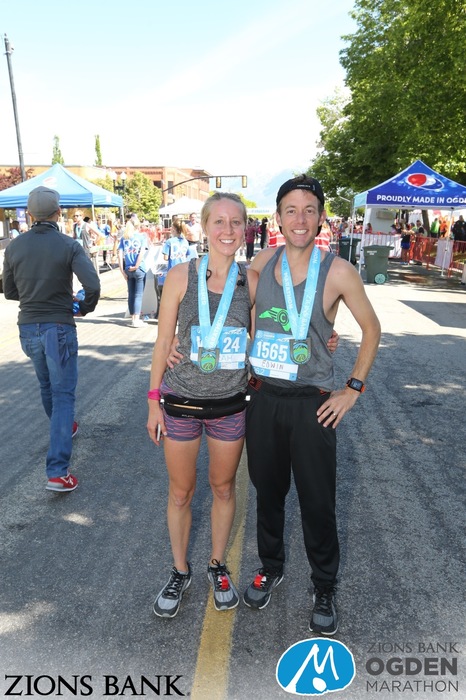


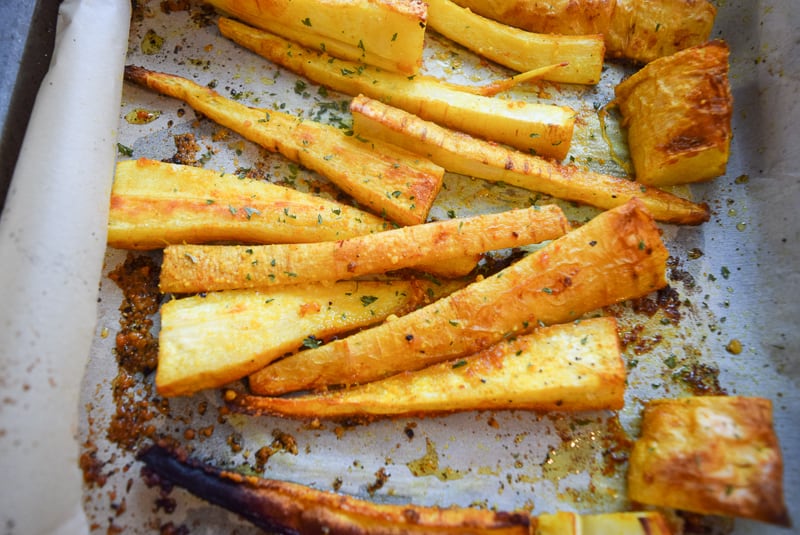
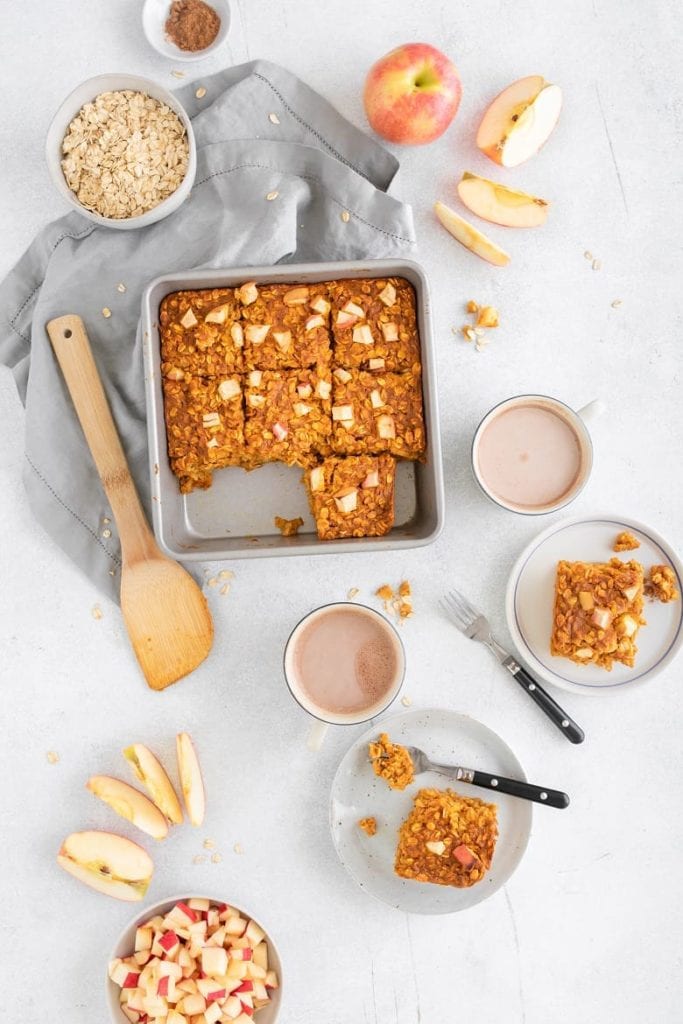


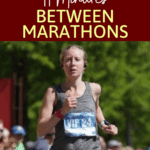
Like This Content?
Support Bucket List TummyAhh I loved reading this and am still so excited that you qualified for Boston! I love your balanced approach to running, healthy eating, desserts, etc. & seriously look forward to your posts (and need to comment more because I always enjoy them!)
Aww, thank you so much Liv. That means so much to me!
Way to go, speedy gonzales! 😉 These are great tips!
Congrats on your new PR!!! I guess my main tips for running a BQ are:
1) Take the pressure off yourself! Just do your best and take what your body gives you that day.
2) Speedwork and specific workouts. Shake it up!
3) Core Work – like you mentioned. Planks are so helpful.
I found that whenever I went into a race not worried about a certain time, a new BQ usually happened 🙂 Less pressure the better. Running is fun, let’s keep it that way!
I feel the same about less pressure and not stressing. And shaking up speedwork is so important, otherwise I get bored and dread it. Congrats to you for your BQ!
Hey Sarah,
Congrats!! I am so happy for you! Pumped to have another UMass-educated RD on the course in April! I’m actually going to use that trip home to knock the bridal shower off the to-do list (one of my non-New Englander bridesmaids will be running too, and pretty much everyone else lives up there) before I get married in July 🙂
As for your tips, a few really stand out to me:
– Run with people! For my first marathon, I actually trained at UMass by myself and had no idea what I was doing. Once I moved to NOLA for my internship and started running with people I realized what a huge asset that is. There are days when running isn’t at the top of my list of “wants” but chatting with my friends is always up there
– BE CONSISTENT WITH SPEED WORK. It’s definitely possible to get fast without this (especially in someplace hilly like Amherst) but it happens a whooooole lot quicker if you hit the track. Combining track with the friends is huge, because speed work is the devil
– Rest! There is a reason it took me 4 years between my first two marathons. I got too excited, wouldn’t rest, and got injured…a LOT.
Again, congrats!! Planning on catching the game on Saturday before the race, you should join/we should catch up for snacks!
Hey Lauren, Congrats to you too!! You rocked it. I would LOVE to meet up and catch up in person! I need to take a trip to Amherst soon – can you believe I haven’t been there in like 8 years? I bet it looks sooo different. So much fun ahead!
Build Amherst into your Boston trip! It misses you, I bet. Still beautiful as ever as of December.
Congrats on your huge PR! These are really great tips. I have been thinking about going for my 2nd marathon in 2018, but I haven’t committed to anything yet!
Thanks Janelle. I’m sure you’ll feel much different if you go for your second vs. your first!
Great tips!! Thank you for sharing!! BQ BQ BQ!!! You are a rockstar!
Thanks so much for your support, Alisha!
All fabulous tips! I hope to need to use them one day. I think when I first started running one of my big mistakes was with fat. I knew I needed carbs for recovery, but 10 years ago people weren’t raving about fats.
RIGHT? Gimme all the healthy fats!
The pace groups kind of make me nervous, even if they are way slower than my normal it makes me anxious I can’t keep up. Isn’t that weird? You KILLED it though, congrats and great tips!
I can definitely see how it can be a source of anxiety too. I’m still working on trying NOT to focus on pace so much 🙂 Thanks, Kelli!
I’m a fan of brown rice, as they’re healthier. To me, the taste is the same as with white rice, not much difference. Love your selection of breakfast, though!
I haven’t done a marathon, but will use this post as checklist when it comes. Thanks!
Thanks for reading, Erica!
There’s a huge difference between a first and second marathon. You have some knowledge but you don’t know it all. In fact, I don’t think you can ever know it all for a marathon. Or any race for that matter. Your avocado toast looks amazing. I think I need to recreate that asap!
Totally agree that we can’t ever know it all. Running is such a learning process!
great tips! I have never trained for a marathon but half marathon training makes me hungry! At least 2 breakfast hungry! 🙂 Congrats on that race. I went from 2:25 to 2:12 last year on my half and I am still happy about that! Thanks for linking up!
I’m a fan of two breakfast days 🙂 That’s a huge improvement, congrats!
Excellent tips from a wise wise mind. Congrats again!!
Thanks lady!
This is so helpful. I never thought about eating at any sign of hunger. I really would like to follow as many of your tips as possible for the next marathon training, as I think, hopefully, that I’m almost ready to start training for marathon #3 in a healthier mindset than I’ve had before. 🙂
I’m excited for your future, Emily, and can’t wait to hear more about your plans.
These are great tips Sarah. I especially like the recovery aspect and eating a lot while you’re tapering. I am in recovery mode now and the soreness makes foam rolling a bit of a shit show. Still doing it though 🙂 And my appetite is on FIRE
I am a huge fan of the power of food, clearly 🙂 My appetite is always so much higher when I’m resting or tapering, it seems to be the body’s way to catching up.
I am a pretty inexperienced runner so I really appreciate the tips. Congrats on the qualification!
I hope you found them helpful, Emily! Let me know if you have any other questions 🙂
These are great! I definitely agree its very different to run your first marathon. Core work, good nutrition, and hydration are so important!
Absolutely – it’s amazing how you can feel if you prepare right.
These sounds like great tips! Congratulations on your BQ!
Thank you so much!